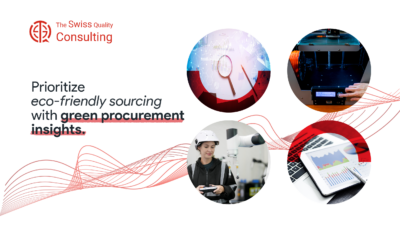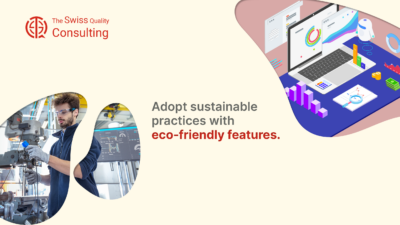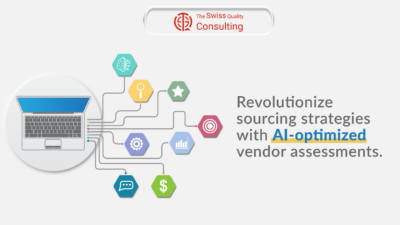Embracing Sustainability in Supply Chain Management
Introduction
In the current era of environmental consciousness, prioritizing eco-friendly sourcing with green procurement insights is not just a trend but a necessity for businesses. This article aims to guide business executives, mid-level managers, and entrepreneurs on the importance of green procurement and how it contributes to sustainable business success.
The Growing Importance of Eco-Friendly Sourcing
In today’s environmentally conscious world, green procurement has emerged as a cornerstone of sustainable business practices, encompassing the strategic sourcing of goods and services that minimize environmental impact and promote sustainability throughout the product lifecycle. Unlike traditional procurement practices that prioritize cost and availability, green procurement places a strong emphasis on environmental considerations, ensuring that the products and services businesses acquire are produced, transported, used, and disposed of in a way that safeguards the environment for future generations.
At the heart of green procurement lies a holistic approach that encompasses the entire product lifecycle, from raw material extraction and manufacturing to transportation, use, and end-of-life disposal. This cradle-to-cradle approach encourages businesses to consider the environmental footprint of each product throughout its entire lifecycle, identifying potential environmental impacts and seeking ways to minimize them.
Green procurement practices encompass a wide range of considerations, including:
Environmental Impact of Materials: Businesses prioritize the use of recycled, renewable, and sustainably sourced materials, reducing reliance on virgin resources and minimizing the environmental impact of raw material extraction.
Energy Efficiency and Emissions Reductions: Businesses seek products and services that are energy-efficient, reduce greenhouse gas emissions, and minimize the consumption of fossil fuels.
Waste Reduction and Recycling: Businesses favor products with minimal packaging, promote reusable materials, and adopt strategies to reduce, reuse, and recycle waste.
Sustainable Manufacturing Processes: Businesses source products from manufacturers that employ eco-friendly manufacturing practices, minimize pollution, and adhere to environmental regulations.
Sustainable Transportation and Logistics: Businesses optimize transportation routes, utilize fuel-efficient vehicles, and explore alternative transportation modes to reduce their carbon footprint.
The benefits of embracing green procurement extend beyond environmental stewardship; they translate into tangible business advantages, including:
Enhanced Brand Reputation and Customer Loyalty: Consumers increasingly favor businesses that demonstrate a commitment to sustainability, boosting brand reputation, attracting eco-conscious customers, and fostering customer loyalty.
Cost Savings and Risk Reduction: Green procurement often leads to cost savings through reduced energy consumption, waste minimization, and improved resource utilization. It also mitigates environmental risks, reducing the potential for regulatory fines and reputational damage.
Competitive Edge and Market Differentiation: Green procurement positions businesses as leaders in sustainability, differentiating them from competitors and attracting environmentally conscious investors and partners.
Innovation and Sustainable Growth: Embracing green procurement fosters innovation and drives the development of sustainable products and services, positioning businesses for long-term growth and success in a resource-constrained world.
In essence, green procurement is not merely an environmental initiative; it is a strategic approach that aligns business objectives with sustainability principles. By adopting green procurement practices, businesses can reduce their environmental impact, enhance their brand reputation, gain a competitive edge, and contribute to a more sustainable future for all.
Building a Sustainable Supply Chain
Adopting eco-friendly sourcing practices plays a vital role in building a sustainable supply chain, reducing carbon footprint, and promoting environmental stewardship.
Role in Change Management
Integrating green procurement insights into sourcing strategies is a significant part of change management in modern businesses. It requires a shift in mindset and operations, moving towards more responsible and sustainable practices.
Transforming Business Operations for Sustainability
Effective change management strategies are essential for businesses to successfully adopt green procurement practices, ensuring a balance between profitability and environmental responsibility.
Impact on Executive Coaching and Leadership
Leadership is critical in the successful adoption of eco-friendly sourcing practices. Executive coaching programs now increasingly emphasize the importance of sustainability leadership and responsible decision-making in supply chain management.
Leading with a Vision for Sustainability
Executive coaching prepares leaders to drive the shift towards green procurement, equipping them with the knowledge and skills to make informed decisions that align with sustainability goals.
Effective Communication in Green Procurement
Effective communication is key to implementing green procurement practices. It involves educating the team and stakeholders about the benefits and importance of eco-friendly sourcing.
Creating Awareness and Aligning Goals
Communicating the strategic vision and practical benefits of green procurement ensures team alignment and fosters a culture of environmental responsibility within the organization.
Generative AI in Enhancing Green Procurement Insights
Generative Artificial Intelligence (AI) can significantly enhance green procurement by providing deep insights into sustainable sourcing options, analyzing supplier practices, and identifying eco-friendly alternatives.
Leveraging AI for Sustainable Sourcing Decisions
Generative AI offers innovative solutions for sourcing, enabling businesses to make data-driven decisions that align with their environmental sustainability objectives.
Conclusion Prioritizing Eco-Friendly Sourcing with Green Procurement Insights
In conclusion, prioritizing eco-friendly sourcing with green procurement insights is an essential strategy for businesses aiming to achieve sustainability and success in today’s environmentally conscious market. By embracing green procurement practices and leveraging advanced technologies like AI, companies can contribute to environmental preservation while meeting their business objectives.
#GreenProcurement, #EcoFriendlySourcing, #SustainableBusiness, #AIinSupplyChain, #EnvironmentalResponsibility























